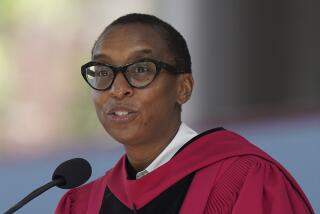Group Protests Denial of Promotion to Feminist
- Share via
More than 60 theologians and religious scholars have protested the decision of Boston College to deny feminist theologian Mary Daly a promotion from associate professor to full professor for the second time.
Daly, 60, has four degrees from the University of Fribourg, Switzerland, and graduate degrees from Catholic University of America and St. Mary’s College in South Bend, Ind.
In 1966 she became the first woman to join the theology faculty at Jesuit-run Boston College. Two years later she published her most influential work, “The Church and the Second Sex,” in which she declared that Catholic women “are conditioned to believe that they have an irremediably inferior nature.”
The next year the college told her they would be firing her, but following protests from students and other faculty the university changed its mind and granted her tenure. Her first bid for full professorship was denied without explanation in 1975, and the university recently informed her that it has denied her second petition for such status, which brings with it a greater salary and increased academic prestige.
Father Robert Barth, dean of the College of Arts and Sciences, told Daly that the promotion committee denied her second request because of her lack of articles in scholarly journals, “the questionable scholarliness of recent books” she has written and her failure to take part in committee work.
At a recent meeting of the American Academy of Religion, 300 scholars signed a petition that urged “the long overdue promotion of Mary Daly to full professor.” Her cause has also been taken up on campus by a group of students and some staff who tried unsuccessfully to stage a sit-in at the residence of Father J. Donald Monan, president of the school.
Among the theologians who have urged that Daly be given tenure are David Tracy, distinguished service professor of the University of Chicago Divinity School, who called her “one of those rare theologians whose work all theologians need to read and respond critically to”; Harvey Cox of the Harvard Divinity School, who said, “It is hard to imagine where the whole field of religious and theological studies would be today were it not for the contributions she has made”; and Margaret R. Miles of Harvard Divinity School, who described her as “the most articulate and influential critic of religion, philosophy and society of any person of our time.”
Daly has described the second refusal of her application for promotion as an example of “extreme bigotry and parochialness, as well as absolute hypocrisy about academic freedom.”
More to Read
Sign up for Essential California
The most important California stories and recommendations in your inbox every morning.
You may occasionally receive promotional content from the Los Angeles Times.













